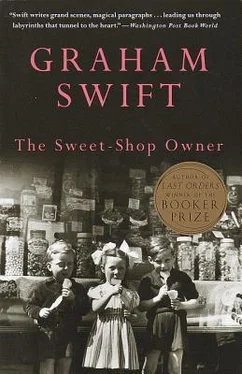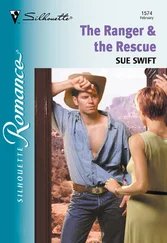Graham Swift - The Sweet-Shop Owner
Здесь есть возможность читать онлайн «Graham Swift - The Sweet-Shop Owner» весь текст электронной книги совершенно бесплатно (целиком полную версию без сокращений). В некоторых случаях можно слушать аудио, скачать через торрент в формате fb2 и присутствует краткое содержание. Год выпуска: 2012, Издательство: Vintage Books USA, Жанр: Современная проза, на английском языке. Описание произведения, (предисловие) а так же отзывы посетителей доступны на портале библиотеки ЛибКат.
- Название:The Sweet-Shop Owner
- Автор:
- Издательство:Vintage Books USA
- Жанр:
- Год:2012
- ISBN:нет данных
- Рейтинг книги:4 / 5. Голосов: 1
-
Избранное:Добавить в избранное
- Отзывы:
-
Ваша оценка:
- 80
- 1
- 2
- 3
- 4
- 5
The Sweet-Shop Owner: краткое содержание, описание и аннотация
Предлагаем к чтению аннотацию, описание, краткое содержание или предисловие (зависит от того, что написал сам автор книги «The Sweet-Shop Owner»). Если вы не нашли необходимую информацию о книге — напишите в комментариях, мы постараемся отыскать её.
The Sweet-Shop Owner — читать онлайн бесплатно полную книгу (весь текст) целиком
Ниже представлен текст книги, разбитый по страницам. Система сохранения места последней прочитанной страницы, позволяет с удобством читать онлайн бесплатно книгу «The Sweet-Shop Owner», без необходимости каждый раз заново искать на чём Вы остановились. Поставьте закладку, и сможете в любой момент перейти на страницу, на которой закончили чтение.
Интервал:
Закладка:
That was what he’d believed at Ellis’s, before she’d walked in that lunch-time. And what he’d believed, that far-off afternoon, seated by the window in the history lesson. His head was pressed against the dusty glass. He was a shop-keeper in a schoolboy’s outfit. The history master was speaking as if his words were turning into print. Henry VIII and his wives were like characters in costume. They weren’t real, but they didn’t know it. History fitted them into patterns. He was looking out at the still rows of chestnuts, the asphalt, the footballers on their marked-out pitches. You touch nothing, nothing touches you. All the rest is wild adventure. See how the football players turn their game into grim earnest. Their shouts sound like the screams of fighters. And see them still, unappeased by their fervour, trailing home down the path by the iron railings, restless, greedy for something to happen, for the real thing …
‘Chapman! Are you with us?’
He had laughed then, unheard. And at Ellis’s. He’d carried round inside him a little hidden laugh. So that he didn’t mind about his school reports (he was only good at woodwork and distance running) or that his parents were disappointed, or that those others around him in that chalky class-room would get on better than him. Let them go to meet history. History would come anyway. Nothing touches you, you touch nothing.
Sunshine slanted through the striped awning. Over the road, outside Powell’s, the shadows of the lime trees were black and small. Summer, 1938. Sold out, in only a few days, of lemonade and ices. But he’d learn. He’d make something of it: there, in the night, as he lay sprawled beside her, he pictured it, glimmering in the dark, stuffed with ices, with lemonade, with things with no use.
Trams were passing in the High Street, full again in the late afternoon. People were going home, faces hot, collars loosened, calling in for their papers and evening cigarettes. ‘No, sorry — sold out of ices.’ But Powell too had sold out of watercress. Trains were unloading. Homegoers were dispersing down the pavements, past the open doors of the Prince William which sent out a cool, inviting waft of beer, and up over the common. The evening sun was making them come alive, and there — was it in the breeze, in the scent of the grass over the common, in the swing perhaps of a summer dress? — a glimpse of something, slipping away, as in the depths of a forest.
He turned round the sign from ‘Open’ to ‘Closed’. Checked the windows, checked the till, checked the locks. How many times, how many times? He was young then. He carried his jacket over his shoulder. He didn’t need braces to hoist his trousers and his cheeks were not mottled with red. Only the limp to show that he was no longer all that he was. For once he’d been good at running. Over the common, up the Rise, into Leigh Drive. And there she was, opening the front door, ready to take his jacket and case and the evening paper and to give him a smile, like the scattering of coins.
‘Good day?’
This was a sort of code.
‘Four pounds. And I sold out of lemonade.’
Clomp, clomp. Who was that banging into the shop as if he owned it? It was Hancock, ducking his six feet under the door, raising one of his long, elastic arms to fish for his wallet, and leaning forward in a sinuous, confidential way as he asked for cigarettes. ‘Thought you should know. Old Jones died last night. We all knew, didn’t we? Funeral Saturday, already fixed. Shame.’ He pocketed the cigarettes and patted the wallet on his palm. ‘Mrs Chapman all right?’ He looked round the shop. There was a gleam in his eye. ‘Great friend of the Harrisons, old Jones. Poor feller didn’t want to stop work.’ He patted the wallet a second time, turning to go. ‘Thought you ought to know.’
Clomp, clomp. What was that? Another death? Yes. The noise of the earth falling on his father’s coffin. August, 1938. And again, clomp, a month later, on Mother’s. As if they’d said, All right, that’s enough — you first, I’ll follow. As if they’d done it all in time: lived to see their son come into money and marry a beautiful woman; to dance on his wedding night round the living-room. What rejoicing. She did nothing, Mother, in that final month. Only dug out the will which left it all to her — for a month — and made up her own — which left it all to him. You touch nothing. The sun shone at both their funerals, making the white graves in the cemetery sparkle like wedding cakes. Irene stood beside him with her black gloves and black handbag and a black hat with a veil. She took his arm to steady him. And did she see, behind her veil, standing there so firm, that he was no longer all he was?
Clomp. What was that? Only the piles of morning papers, tied with string, being dumped at the door by the lad from the van. He lifted the bundles onto the counter, cut the string, and there, on the appropriate page, were the notices: Jones, Arthur Russell, August 2nd; Chapman, George William, August 16th; Chapman, Edith, September 24th. The neatness of the columns. Deaths, marriages. The black and whiteness of memorials. He hadn’t wanted it in the papers. What sham. But she’d said, it was the thing to do: do it.
Sunlight fell on the piles of papers, on his hands smudged by that same neat print. And what were the headlines then? In September, 1938?
‘WILL GERMANY MARCH?’
6
‘Ah! The ice-cream, Mrs Cooper.’ He looked out through the window. ‘Wouldn’t do to run out on a day like this.’
The blue and cream company’s van had pulled up at the kerb outside and the driver was emerging with his pad of pink receipts and invoices and his blue carbon paper.
‘Let me,’ she said, turning on her heel. But ‘No, I’ll do it,’ he said. ‘You manage here’ (for it was not quite nine and they were coming in thick and fast on their way to work).
‘Lovely weather.’
‘Gorgeous.’
And there he went, in his grey nylon jacket, dodging an incoming customer, out onto the pavement to help the man with his smoking, hoary cartons of ice-cream. Sprightly enough, with his limp, and his heart, and his dumb expression. But he shouldn’t do it (she thumped at the till); what would she do if something happened? Couldn’t she help?
He re-entered bearing three cartons, followed by the delivery man bearing five.
What a fool he was, bringing in the stuff himself, as if it were some sort of precious treasure, and not ice-cream to sell on a hot summer’s day; opening the black lid of the fridge, making room for the new cartons, taking out two loose choc-ices and juggling them — there, up and down — in his hands. Him and his tricks. He turned to go out for more boxes. And she gave him a stare, with the full vulture-like force of her amber spectacles. You shouldn’t: it’ll kill you. But what was he doing, staring back at her, blindly, wiping the cold moisture from the fridge off his hands? Smiling was it? Though his face never moved. Smiling though he wasn’t smiling, so that she was obliged to offer back a great, snarling flash of her teeth (which were not her own) and to feel stupid for it afterwards.
He returned and went out again. What a fool he was, prancing about on the pavement, climbing up into the back of the delivery van and hopping down again, as if he were only a kid.
And what was he doing out there? Signing the delivery man’s pink pad and slipping him — what was that for? — a pound tip?
He entered again, puffing, carrying the last of the treasure chests. His face was like a red balloon.
Yes, she thought, seeking the source of that invisible smile. It must have been beauty.
7
Sit back Willy; drink your tea, rest your head, if you like, on my lap (he did not hear, there in the autumn evening by the french windows, but what did he ever hear of those inward commands, spoken to soothe her own nerves?). You’re tired. Think of nothing, listen to the clock ticking on the mantelpiece. All day at the shop; and two visits, twice in two months, to the grave-side. Rest your head. Sometimes I see in your face that little hidden smile, far behind it all, as if you don’t mind, as if you’ll play your part, laugh at the joke. How that pleases me. And yet sometimes, like now, when you’re tired, it goes out, that tiny flicker of laughter, as if you’d said, no, it’s not a joke, things must happen; I’ll have what is mine. How stern you look then, how earnest. How frightened you make me. There, be still. Listen to the clock. Relight the flame.
Читать дальшеИнтервал:
Закладка:
Похожие книги на «The Sweet-Shop Owner»
Представляем Вашему вниманию похожие книги на «The Sweet-Shop Owner» списком для выбора. Мы отобрали схожую по названию и смыслу литературу в надежде предоставить читателям больше вариантов отыскать новые, интересные, ещё непрочитанные произведения.
Обсуждение, отзывы о книге «The Sweet-Shop Owner» и просто собственные мнения читателей. Оставьте ваши комментарии, напишите, что Вы думаете о произведении, его смысле или главных героях. Укажите что конкретно понравилось, а что нет, и почему Вы так считаете.












